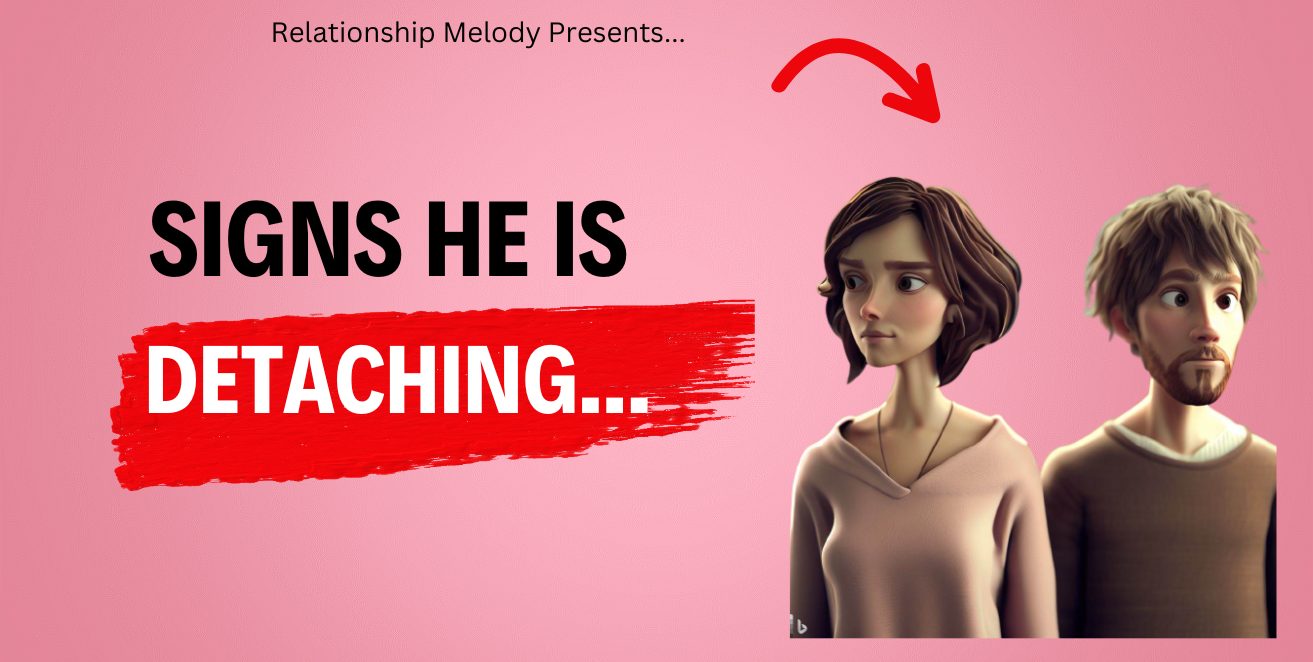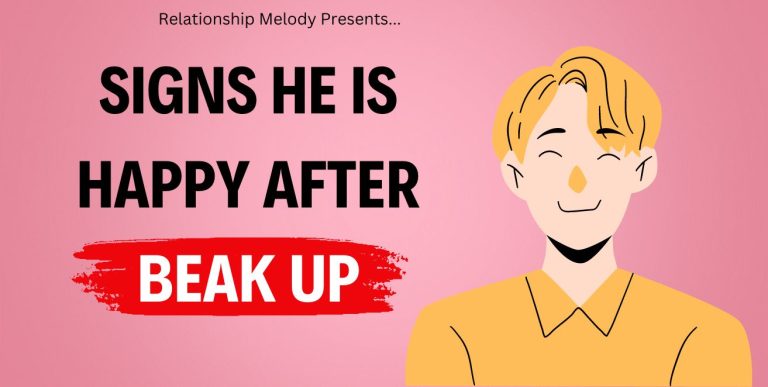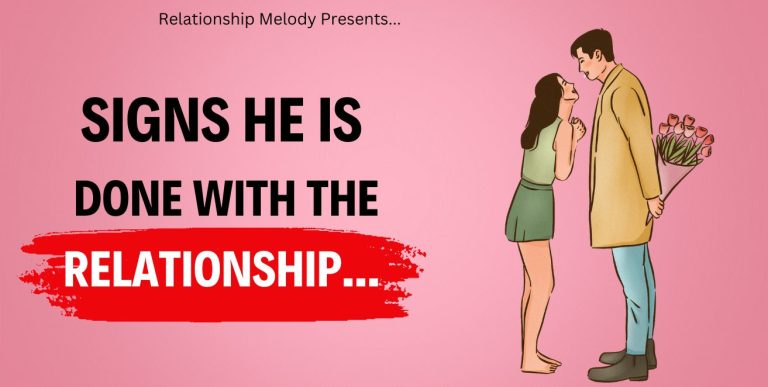25 Signs He Is Detaching
Maintaining a healthy and fulfilling relationship requires effort and constant communication from both partners. However, there are instances when one partner begins to detach emotionally, creating a noticeable imbalance within the relationship.
If you’ve been sensing a shift in your partner’s behaviour, it’s crucial to be aware of the signs of detachment. Understanding these warning signs can help you address the issues and potentially salvage your relationship.
In this blog post, we’ll explore 25 common signs that indicate your partner may be detaching, enabling you to take the necessary steps to address the situation.
25 Signs He Is Detaching
Here are 25 signs to know.
#1 Decreased Communication:
When your partner starts to detach, you’ll notice a decline in communication. They may become less engaged in conversations, avoid discussing important topics, or provide vague and non-committal responses. This lack of communication creates a disconnect and prevents the emotional connection from flourishing.
#2 Lack of Emotional Support:
Emotional support is a vital aspect of a healthy relationship. If your partner is detaching, they may exhibit a diminished interest in your emotional well-being. They might not offer the comfort, empathy, or understanding that they used to provide, leaving you feeling unsupported during challenging times.
#3 Reduced Intimacy:
Intimacy encompasses both physical and emotional closeness. When detachment occurs, you may notice a decline in affection, sexual activity, and quality time spent together. Your partner might become distant and less interested in connecting on a deep emotional level or engaging in physical intimacy.
#4 Increased Secrecy:
Detachment often leads to increased secrecy. Your partner may start hiding their phone or online interactions, avoiding transparency about their whereabouts, or becoming defensive when asked about their activities. This behaviour erodes trust and indicates a desire to create distance and keep aspects of their life separate from the relationship.
#5 Frequent Arguments:
Detachment can lead to heightened tension and frequent arguments. Your partner may seem less interested in resolving conflicts or finding common ground. They might become defensive, dismissive, or unwilling to engage in productive communication, creating further emotional distance between you.
#6 Disinterest in Future Plans:
A sign of detachment is a lack of enthusiasm when discussing plans together. Your partner may avoid committing to long-term goals or display indifference towards building a shared future. This lack of investment in the relationship’s future can signal a diminishing commitment and emotional detachment.
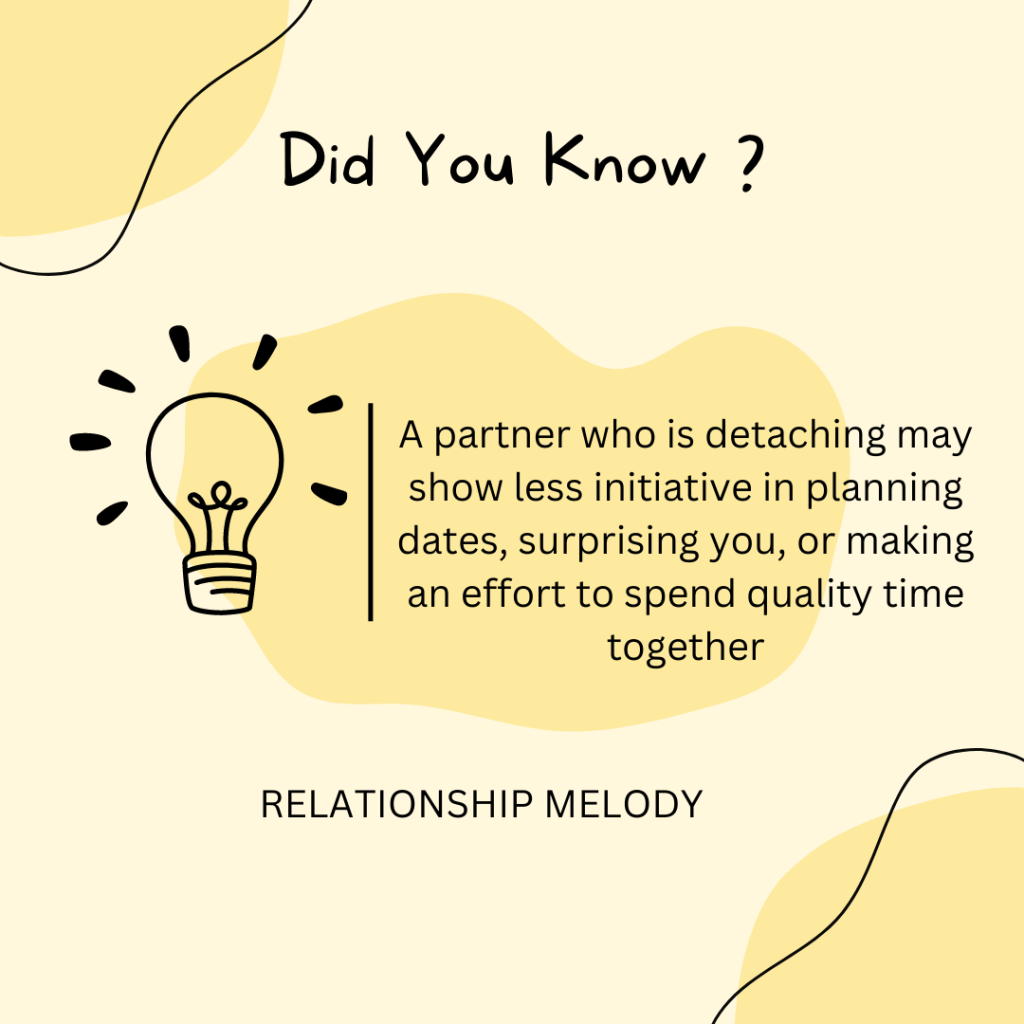
#7 Emotional Withdrawal:
Emotional withdrawal is a clear indication of detachment. Your partner may become emotionally distant, guarded, or less responsive to your emotional needs. They might withhold affection, intimacy, or emotional vulnerability, creating a sense of disconnection and loneliness within the relationship.
#8 Change in Priorities:
When someone detaches, their priorities often shift away from the relationship. Your partner may begin prioritizing other aspects of their life, such as work, hobbies, or friendships, at the expense of investing time and effort into nurturing the relationship. This change in priorities can leave you feeling neglected and unimportant.
#9 Decreased Physical Affection:
Physical affection, such as hugs, kisses, and cuddling, tends to decrease when detachment sets in. Your partner may withdraw from physical displays of love and affection, leaving you feeling unloved and disconnected. The lack of physical closeness can reinforce the emotional distance that has developed.
#10 Lack of Empathy:
Empathy is the ability to understand and share the feelings of another person. When detachment occurs, your partner may exhibit a reduced capacity for empathy. They might struggle to comprehend or validate your emotions, resulting in a sense of isolation and invalidation.
#11 Indifference Towards Milestones:
Your partner’s detachment may manifest as a lack of interest in celebrating or acknowledging important milestones in the relationship. They may no longer remember or prioritize anniversaries, birthdays, or special occasions, which can leave them feeling unimportant and undervalued.
#12 Increased Time Apart:
Detachment often leads to increased time spent apart. Your partner may choose to engage in solo activities, spend more time with friends, or immerse themselves in work, leaving you feeling disconnected and excluded from your life.
#13 Avoidance of Conflict Resolution:
Detached partners tend to avoid addressing and resolving conflicts. They may shy away from difficult conversations or actively dismiss and ignore issues that arise. This avoidance prevents the necessary communication and compromise needed to maintain a healthy relationship.
#14 Decreased Initiative:
A partner who is detaching may show less initiative in planning dates, surprising you, or making an effort to spend quality time together. They may become complacent, disengaged, or uninterested in actively nurturing the relationship, further deepening the emotional disconnect.
#15 Neglect of Self-Care:
When someone detaches, they may neglect their well-being. You may notice a decline in their grooming, hygiene, or overall self-care. This neglect can reflect a lack of investment in themselves and the relationship, as their focus shifts away from nurturing both.
#16 Absence of Emotional Connection:
Detachment erodes the emotional connection between partners. You may feel a significant absence of emotional intimacy as if your partner has become emotionally distant and uninvolved. This lack of connection can be disheartening and may leave you questioning the future of the relationship.
#17 Disinterest in Your Life:
Detached partners often exhibit disinterest in their hobbies, interests, and daily life. They may no longer ask questions or engage in meaningful conversations about your experiences. This disinterest signals a lack of investment in understanding and connecting with you on a deeper level.
#18 Change in Communication Patterns:
Detachment can manifest as a shift in the way your partner communicates with you. They may become more distant, less warm, and less open in their communication. Conversations may lack the previous level of depth and vulnerability, contributing to a sense of disconnection.
#19 Increased Criticism:
Detached partners may become overly critical of your actions, appearance, or decisions. They may nitpick and find fault where it did not exist before. This criticism reflects their emotional withdrawal and creates a negative environment within the relationship.
#20 Disregard for Boundaries:
Detachment often leads to a disregard for personal boundaries. Your partner may cross lines, ignore your wishes, or show little respect for your emotional or physical boundaries. This lack of respect further erodes trust and contributes to a sense of detachment.
#21 Lack of Supportive Actions:
A detached partner may no longer support your endeavours or show enthusiasm for your achievements and goals. They may fail to provide encouragement or actively dismiss your aspirations, which can leave you feeling unsupported and devalued.
#22 Unreliable Promises:
Detached partners may consistently break promises or fail to follow through on commitments. Their lack of reliability undermines trust and leaves you feeling uncertain and disappointed. Unfulfilled promises further deepen the emotional disconnect.
#23 Loss of Interest in Shared Activities:
As detachment sets in, your partner may lose interest in participating in activities that you both used to enjoy. They may avoid joining you in hobbies, outings, or shared experiences, diminishing the sense of togetherness and shared enjoyment.
#24 Seeking Emotional Connection Elsewhere:
A detached partner may seek emotional connection and support from external sources. They may turn to friends, co-workers, or online communities to fulfil their emotional needs, further distancing themselves from you within the relationship.
#25 Feeling of Loneliness:
Ultimately, detachment leads to a pervasive feeling of loneliness within the relationship. Even when physically together, you may feel emotionally isolated and disconnected from your partner. This loneliness is a clear sign that intervention is needed to address the detachment and rebuild the emotional bond.
Read More: Signs He Is Desperate To Get Married
Conclusion:
Recognizing the signs of detachment in a relationship is crucial for addressing issues before they escalate further. If you’ve noticed any of these signs in your partner’s behaviour, it’s essential to have an open and honest conversation about your concerns and emotions.
However, it’s important to remember that detachment doesn’t necessarily mean the end of a relationship. By identifying the underlying causes and working together with your partner, you can take steps toward re-establishing a stronger emotional connection and revitalizing your relationship.
Remember, open communication, empathy, and a willingness to address issues are key to fostering a healthy and fulfilling partnership.
Liked Our Article? Feel Free To Support Us
Our Patreon link: https://www.patreon.com/RelationshipMelody
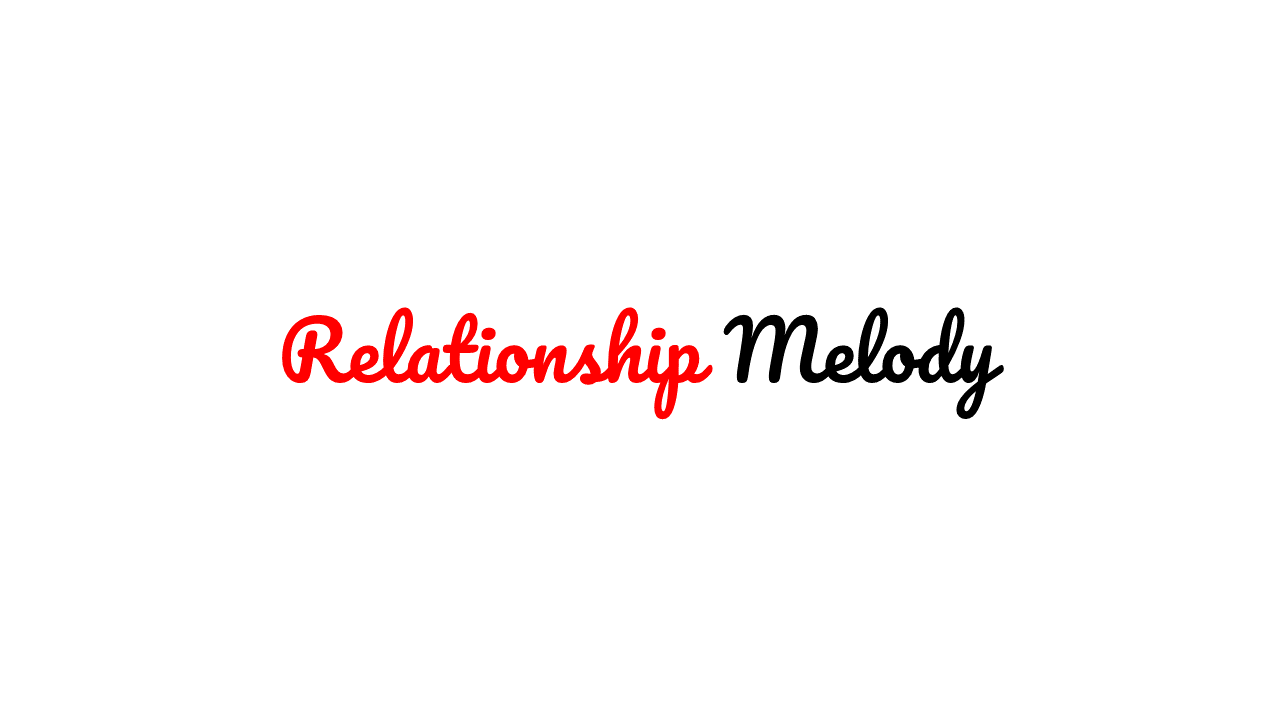
Welcome to Relationship Melody! Our website is dedicated to all things on relationships, dating, and love! We are passionate about helping you navigate the ups and downs of love, and our goal is to provide you with valuable insights and information that will make your journey toward a fulfilling relationship smoother and more enjoyable.

